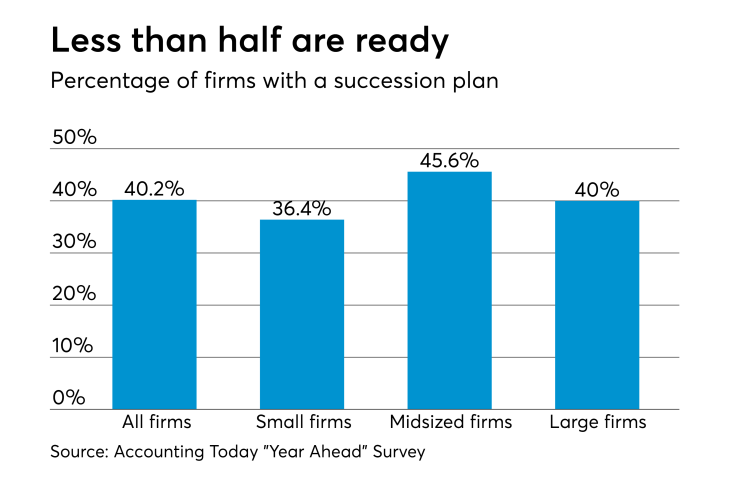In 2016, an
Among independent firms that have taken steps to develop and promote young leaders — including promotions to managing partner, president or shareholder — BKR International gathered opinions from some of its Americas member firm leaders to learn what exactly helped those firms make the transition sooner. Here’s what these leaders said they need to run tomorrow’s CPA firms and what they wish they knew about sooner.
Emphasize soft skills
Communication came up frequently when polling young leaders and graduates of the BKR Leadership Institute, a program that has graduated over 300 emerging leaders with a curriculum focused on operating a successful CPA firm. A big takeaway from program graduates, who are now leading firms, is that they need to have strong communication skills — not only technical, but interpersonal skills, to understand different communication styles and the nuances of their clients in different industries.
“Adapting to those different personality styles quickly has been a huge takeaway from my training. I use those communications skills every day,” said Jeremy Vokt, the new managing shareholder at Bland & Associates, a Top 300 firm with offices in Omaha and Lincoln, Neb.
Equally important to leaders are soft skills for working with and developing their employees and fellow partner relationships. Since many CPA firms include staff members from several generations, it’s easier for miscommunication to happen. Conner Ash P.C., founded in 1926, addresses this challenge with a formal system to bridge the communications gap, according to Alicia Brockland, president of the St. Louis firm.
“We have focused on nurturing a culture where individual differences and strengths are celebrated while bringing awareness to stylistic differences between the generations,” Brockland says. “It’s a challenge, but we actively work on it.”

Build AI awareness into the culture
Young leaders like Brockland and Vokt also realize that the adoption of artificial intelligence and new technologies will be central to their future leadership and probably their legacy.
Two years ago, Vokt held an internal presentation to the Bland team on the rise of artificial intelligence and its anticipated impact on CPA firms.
“I think they were laughing a bit at the time because I tried to scare them, but [it] started conversations and now other staffers besides me are keeping up with it,” Vokt said. “While it’s hard to know right now how a firm of our size should adapt, when the time comes we will understand all the tools at our disposal. It’s a must.”
Meanwhile, Conner Ash has an entire service area devoted to client accounting software selection, set-up, integration and training, as well as cloud-based solutions which are helping Brockland and other firm leaders understand and prepare for the evolution of the public accounting industry.
Transition client rapport ASAP
A common concern among younger leaders is the timing for transitioning client relationships, as only 42 percent of multi-leader firms in the AICPA PCPS survey said that they were making it a priority to delegate client work.
“A transition of client relationships is vital to ensure client retention and internal promotion of new partners,” noted Sean Boland, a BKR Leadership Institute graduate and current managing principal at DS+B in Minneapolis. “You need that transition of client knowledge long before a partner is planning to retire,” he said.
Boland emphasized the importance of not only a training opportunity, like the BKR International Leadership Institute, to prepare future leaders, but also a formal internal training program. This prepares young leaders for the responsibilities of client management to a particular firm, as well as managing teams and running a business. A cohort of emerging leaders across firm practices have trained together at DS+B, he said, so that they build relationships with each other and understand all of the firm’s capabilities.
Identify key business skills
This leads to the distinction of technical skill-building versus business skill-building. One of the biggest takeaways Boland had from his leadership training through BKR was how to think like an owner and not just serve clients well: “I wish I had learned earlier about delegation skills and understanding the real numbers and business principles behind a successful CPA firm," he said. "I would have taken more management classes as well, [and] MAP CPE earlier and more often.”
Vokt agreed: “I wish I had taken leadership courses sooner,” he said. “Those of us now in leadership have spearheaded an internal leadership program called 'BLING: The Bland Leadership Institute for the Next Generation.' The focus is on team leadership skills, communication skills, adapting to other personalities, etc. The first two classes graduate this fall and the feedback has been phenomenal. We plan to start the next groups in early winter.”

Network, network, network
It can be lonely at the top. Young leaders who are now managing CPA firms emphasized the value of having peers with whom they can discuss challenges and ideas. Whether they rely on fellow partners to make connections, join a local leadership group, or access partner training resources through their professional associations, Vokt and Boland agreed that having their own business peer network is invaluable to managing change.
“We have three partners at our firm around the same age and have been fortunate to run the firm together for the last 12 years,” Vokt said. “We also learn business techniques from our clients that we can apply to our firm.”
“Commitment to change,” added Boland. “That skill alone will help us adapt with changing times.”





